T-bucket
This article needs additional citations for verification. (September 2014) |
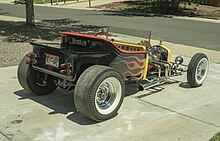
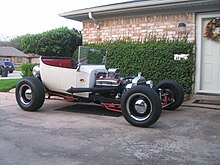
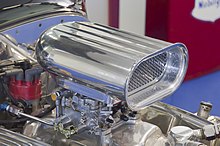
A T-bucket (or Bucket T) is a hot rod, based on a Ford Model T[1] built from 1915 to 1927, but extensively modified. T-buckets were favorites for greasers.[citation needed]
History
[edit]Model Ts were hot-rodded and customized from the 1920s on, but the T-bucket was specifically created and named by Norm Grabowski in the 1950s.[citation needed] This car was named Lightning Bug,[citation needed] better known as the Kookie Kar, after being redesigned by Grabowski and appearing in the TV show 77 Sunset Strip, driven by character Gerald "Kookie" Kookson. The exposure it gained led to numerous copies being built.
A genuine T-bucket has the two-seater body of a Model T roadster (with or without the turtle deck or small pickup box), this "bucket"-shaped body shell giving the cars their name. A Model T-style radiator is usually fitted, and even these can sometimes be barely up to the task of cooling the large engines fitted. Windshields, when fitted, are vertical glass like the original Model T.
Today, T-buckets remain common. They generally feature an enormous engine for the size and weight of the car, generally a V8, along with tough drivetrains to handle the power and large rear tires to apply that power to the road. The front wheels are often much narrower than the rear wheels, and are often motorcycle wheels.
Replicas
[edit]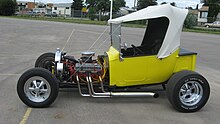
Since the last Model Ts were built in 1927, most modern T-buckets use replica fiberglass bodies. By the 1950s, original steel Model T bodies that had not been completely worn out were becoming increasingly hard to find and in 1957 the first fiberglass T-Bucket body[2] (based on the 1923 version) was introduced by the short-lived Diablo Speed Shop in Northern California. Of the only two or three bodies built by Diablo, one was purchased by Southern California hot rod builder Buzz Pitzen and became the world's first fiberglass T-bucket.[3]
Show cars
[edit]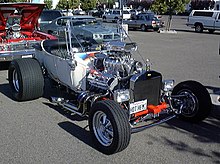
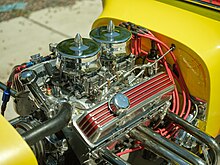
Most are built purely for street or show use, and the big engines are more for show than for need — many are more powerful than the vehicles can use. Although the body shell is original in appearance, engines of a wide variety of makes are commonly used. The small-block Chevrolet is a common choice, since it is relatively small, light, easy to obtain and to improve, and performs well. Four-cylinder engines are also common, especially if the car is used regularly. Some install superchargers on their engines, and some use modern fuel-injected engines.
In popular culture
[edit]A song celebrating the car, "Bucket 'T'," was written by Don Altfeld, Jan Berry, Roger Christian and Dean Torrence and first recorded by Jan & Dean in 1964.[4][5] Subsequent covers of the song were released by Ronny and the Daytonas in November 1964[6] and by The Who on November 11, 1966, as part of their EP Ready Steady Who.[7]

References
[edit]- ^ Jeff Breitenstein. Ultimate Hot Rod Dictionary: A-Bombs to Zoomies. MotorBooks International. pp. 212–. ISBN 978-1-61059-235-2.
- ^ "Fiberglass T Bucket Body: Real History of the Fiberglass T Bucket Body". www.tbucketplans.com. Archived from the original on April 15, 2011.
- ^ "The World's First Fiberglass T-Bucket Hot Rod: Buzz Pitzen's "Glass Image"". www.tbucketplans.com. May 14, 2010. Archived from the original on February 14, 2011.
- ^ "Song: Bucket "T" written by Dean Torrence, Jan Berry, Don Altfeld, Roger Christian | SecondHandSongs". secondhandsongs.com. Retrieved 2024-11-19.
- ^ JanAndDeanMusic (2009-06-21). Jan & Dean - Bucket T. Retrieved 2024-11-19 – via YouTube.
- ^ "- YouTube". www.youtube.com. Retrieved 2024-11-19.
- ^ Back To The Egg (2013-03-12). The Who - Bucket T. Retrieved 2024-11-19 – via YouTube.
